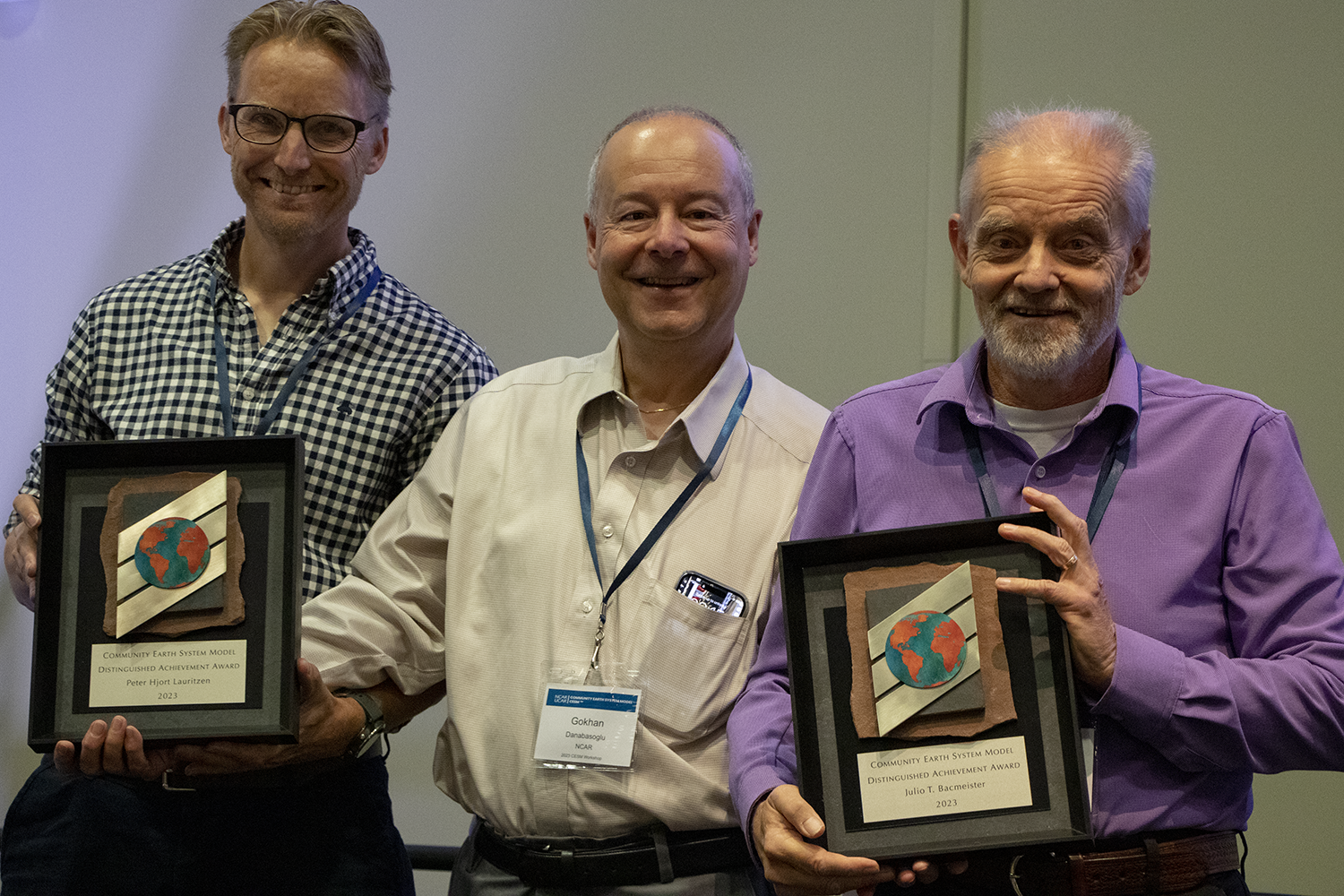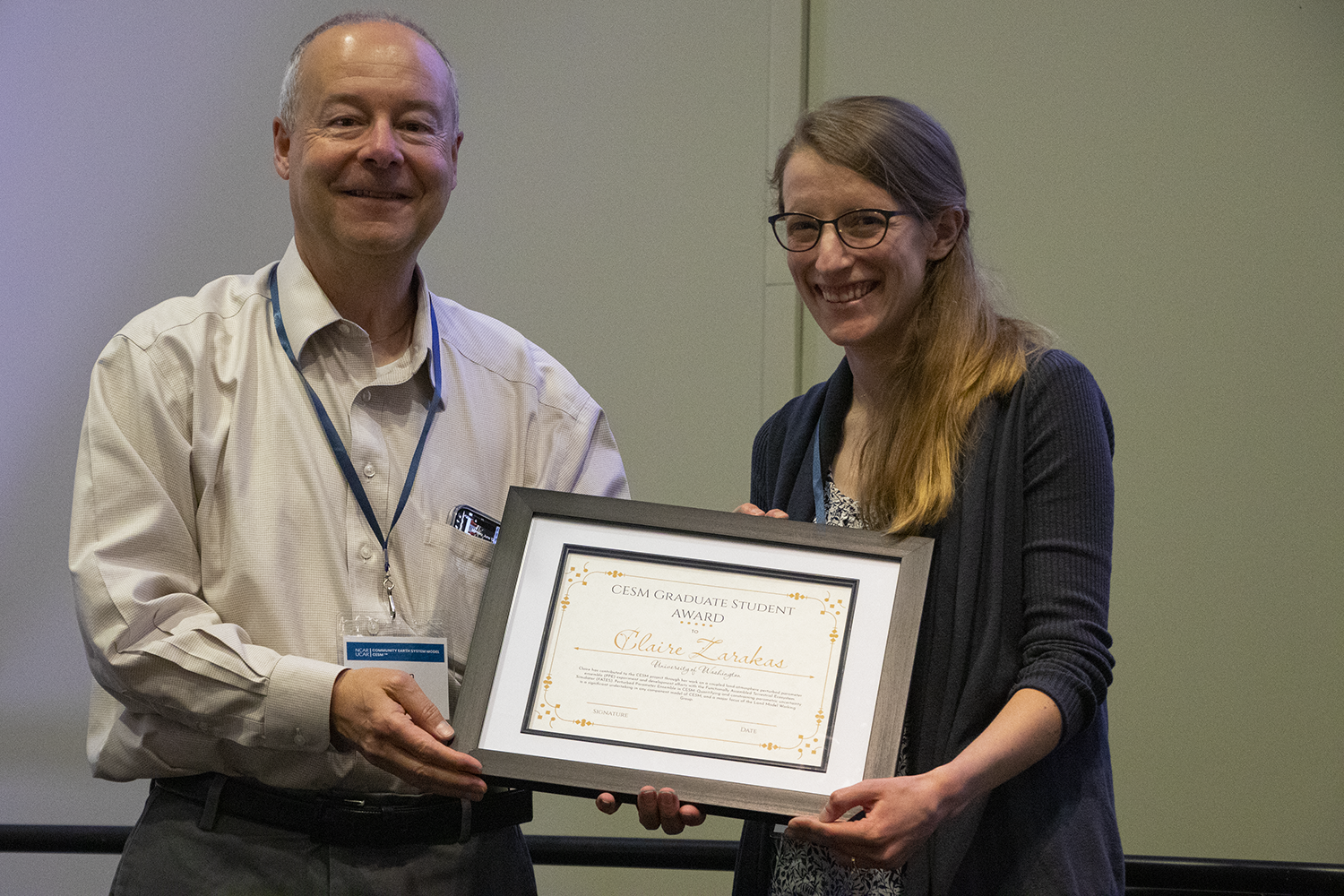CESM Workshop 2023
28th Annual CESM Workshop
The Workshop will begin with a full-day schedule on 12 June 2023 with presentations on the state of the CESM; by the award recipients; and a panel presentation in the morning, followed by Cross-Working Group Sessions in the afternoon and an interactive poster session. On 13-14 June 2023, working groups and cross working groups have half-day sessions, each designed to share information and encourage discussion and collaboration.
2023 Awards

CESM Distinguished Achievement Award
Julio Bacmeister & Peter Lauritzen

CESM Workshop Graduate Student Award
Claire Zakaras
Panel Presentation
Monday June 12, 2023 10:30-11:30AM
The Rising Voices
Co-creating knowledge through Indigenous and Earth Sciences’ collaboration
Here we discuss the NSF Coastlines and People (CoPe) Rising Voices, Changing Coasts Hub, which is led by Haskell Indian Nations University and the Haskell Foundation. The Hub is bringing together Indigenous and Earth systems sciences in collaborative partnerships with the aim of creating new, holistic, and justice-centered knowledge and innovation to improve our understanding of how climate change will impact four diverse coastal regions, and to provide local communities with the information they need to take action and protect their lifeways. The project focuses on coastal change occurring in Hawai‘i, Puerto Rico, Louisiana, and Alaska and is using CESM, along with other tools and approaches, to address questions of coastal inundation, coastal storms, and marine ecosystems.
Cross Working Group Sessions
Monday June 12, 2023 1:30-3:30PM
Session I: Actionable Science and Convergence Research
Organizers: Monica Morrison and Will Wieder
This session will focus on cross-working group efforts related to climate justice and actionable science and provide a forum for discussing the intersection of ethical considerations in convergence research. The session will consist of invited and solicited talks from members of the community to share their research efforts and experiences followed by an open community discussion. We are interested in identifying and discussing 'wins' and 'challenges' experienced by the members of the CESM community associated with conducting just and actionable research within the context of Earth system modeling. We invite members of the community who are interested in presenting on their work and experiences to submit abstracts.
Monday June 12, 2023 1:30-3:30PM
Session II: Understanding Change at the Intersection of CESM Components
Organizers: Rich Neale, Brian Mederios, Julio Bacmeister
Humanity lives in the regions closest to the earth’s surface, where applications of CESM are mostly focused and have the greatest impact. CESM fidelity at this location requires an accurate representation of states, surface model component fluxes and their time evolution. Critical to this fidelity is the manner in which surface component models interact, through their underlying assumptions and vertical resolution. CESM3 is expected to include increased vertical resolution in the atmosphere, and crucially a surface layer thickness that will decrease from 120 m to 20 m. This motivates a more in-depth understanding of near surface climate sensitivities and how they may result, possibly erroneously from model formulations.
With a thin near-surface atmospheric layer, surface model vertical extent assumptions could in principle extend above, or mostly within the lowest atmospheric layer. This is the case for vegetation canopy layers and could be the case for chemical and aerosol emission levels. Most profoundly, where the surface ends and the atmosphere begins remains poorly defined. These and as yet unknown sensitivities could be significant and possibly exist on infrequently monitored timescales, such as over the diurnal cycle, or have an impact on applications such as S2S.
This cross-working group will bring together scientists (developers and users) to examine aspects of the model’s behavior at all component model intersections. Of particular interest will be the aspects highlighted above, but more broadly we invite scientists with an interest in coupling strategies, sensitivities and near surface properties in CESM.
Monday June 12, 2023 4:00-6:00PM
Session III: Parameter estimation for uncertainty quantification, calibration, and process understanding
Organizers: Linnia Hawkins, Katie Dagon, Trude Eidhammer, Margaret Duffy, Claire Zarakas
Efficient and accurate model parameter estimation is a perpetual challenge shared by CESM working groups. There has been renewed interest in parameter uncertainty exploration, largely due to a confluence of recent scientific advancements. First, large observational datasets are becoming more readily available and accessible via cloud storage and computing. Second, increased computational capacity has enabled the generation of ensembles of model simulations with strategic perturbations to model parameters. Third, machine learning algorithms are emerging as valuable tools for high-dimensional data-driven tasks such as parameter estimation. Given these advancements, many groups are exploring and developing methods for more accurate and efficient exploration of model parameters. This session will provide an opportunity to share knowledge and experience across working groups and collectively advance methodologies.
We encourage abstract submissions focusing on methods for parameter estimation, as well as scientific applications to enhance process understanding. Our objective is to promote the exchange of knowledge and experience across working groups and foster collaboration. We welcome a wide range of submissions from various applications, covering scales from point to global, and encompassing various Earth System Models, model components, and configurations.
Monday June 12, 2023 4:00-6:00PM
Session IV: (Ultra-) High Resolution and Regionally-Refined Modeling
Organizers: Simone Tilmes, Sophia Macarewich
This session will cover cross-working group efforts on (ultra-) high resolution, regionally-refined, and limited area modeling. First, we plan to outline existing capabilities and resources, science applications, and software engineering limitations of these modeling applications across different working groups through a series of invited talks. Following these presentations, we will host a discussion on community interests and needs with respect to (ultra-) high resolution, regionally-refined modeling, and limited area modeling development. We invite everyone interested in or working in this area to participate in the discussion and share their experiences and ideas.
The use of CESM technology services
Tuesday June 13, 2023 5:30-6:30PM
While the CESM has traditionally been oriented toward the academic while it is clear that it has the potential to be a powerful tool for addressing societal needs that are being identified and served by the technology industries. This session brings together industry leaders to speak about current/prospective use cases for the CESM model and CESM data in the private sector. Join us to hear four perspectives on how the need for information driving a new user-base for CESM models and datasets.
Chaired by Alicia Karspeck and Gokhan Danabasoglu
Speakers:
- Dr. Polly Buotte, Planetary Ecologist, Earthshot Labs; Research Scientist at UC Berkeley
- Dr. Josh Hacker, Chief Science Officer, Jupiter Intelligence
- Dr. Jean-Francois Lamarque, Senior Expert in Climate Analytics at McKinsey
- Dr. Mike Pritchard, Director of Climate Simulation Research at NVIDIA
